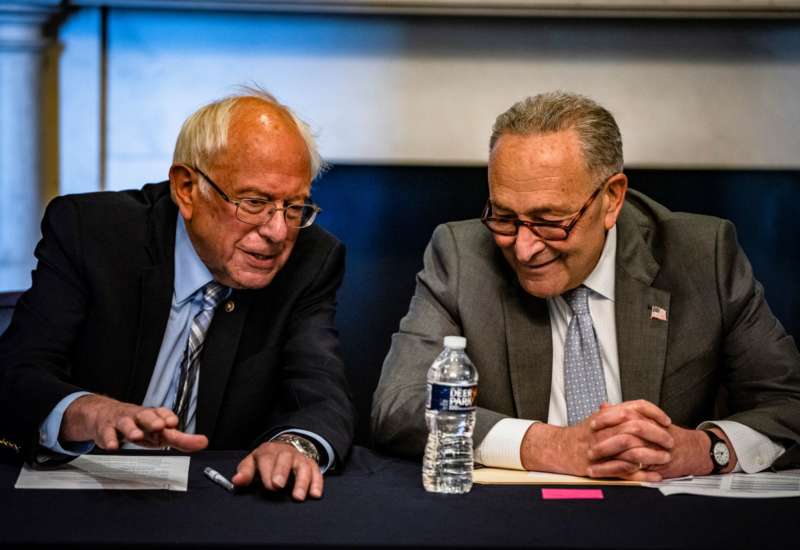Senate Democrats have unveiled their $3.5 trillion reconciliation bill with provisions like paid leave, expanding Medicare coverage and proposals to tackle the climate crisis in the U.S. The Democrats plan on passing the bill alongside the bipartisan infrastructure package that’s currently being debated in the Senate.
The reconciliation bill, spearheaded largely by Sen. Bernie Sanders (I-Vermont), contains many of the provisions that were carved out of the infrastructure package that President Joe Biden had originally proposed in the spring. That includes traditional infrastructure provisions, such as funding for affordable housing upgrades and transportation.
Included are proposals to support the “human infrastructure” in the country that were in Biden’s American Families Plan and which were cut out of the bipartisan agreement completely. The bill also includes a proposal for federal paid family and medical leave, funding to make two years of community college tuition free and a proposal for universal pre-kindergarten.
Democrats included several provisions in the bill to address the climate crisis — crucial items that would not be able to pass the 60-vote Senate filibuster as it currently stands. The infrastructure bill, as climate advocates have pointed out, is Biden’s and Democrats’ last best chance to pass legislation that can achieve the president’s goal of reducing 2005 emissions levels 50 percent by 2030.
Investments in electrifying the federal vehicle fleet and buildings included in the bill go toward that goal. Proposals that climate advocates have long said are necessary for combating the climate crisis, such as the creation of a Civilian Climate Corps and funding for climate justice programs have been included in the bill.
Inclusion of the climate proposals was a crucial aspect of this reconciliation package as Republicans, and some conservative Democrats, are still determined to uphold climate denial, fighting against provisions to combat the climate crisis in the infrastructure bill and elsewhere. If climate proposals fail to pass through the budget reconciliation process, which only requires a simple majority vote to pass legislation, their chances of passing the Senate are extremely low without filibuster abolition.
The much-vaunted health care proposals that Democratic party members have been fighting for in recent months are also part of the reconciliation bill. Democrats aim to reduce the Medicare eligibility age and expand Medicare to cover dental, vision and hearing. The exact age for Medicare eligibility is yet to be made public, but Democrats have previously mentioned lowering it to 60 or 55 from the current threshold of 65.
Progressives have lauded the $3.5 trillion package as consequential, touting its provisions to help families and the working class while taking on climate change.
“The $3.5 trillion Budget Resolution that I am introducing today will allow the Senate to move forward on a reconciliation bill that will be the most consequential piece of legislation for working people, the elderly, the children, the sick and the poor since FDR and the New Deal of the 1930s,” said Sanders in a statement. “It will also put the U.S. in a global leadership position to combat climate change and make our planet healthy and habitable for future generations.”
Sanders also emphasized that the bill would help level the playing field between wealthy people and the middle and lower classes, with funding to both help enforce existing tax laws for the wealthy and achieve “tax fairness” — as a memo accompanying the bill puts it.
Though some lawmakers have hailed the bill, it’s still considered a compromise by and large by progressives. As Ana Malinow pointed out for Truthout, lowering the Medicare eligibility age slightly is a far cry from Medicare for All. “The proposal [to lower the eligibility age to 60] is even weaker than Hillary Clinton’s in 2016, when she offered to lower the age to 50 or 55 even without the presence of a global pandemic,” Malinow wrote.
As Rep. Jamaal Bowman (D-New York) said on Twitter, progressives had originally wanted $10 trillion, so the bill is already a compromise for the left plank of the party.
“We wanted $10 trillion. But still, this is a badly needed investment, which is why more than 60 percent of Americans support the legislation,” Bowman said. “This is a crisis, so here’s my message to the Senate: #NotOnePennyLess, because $3.5 trillion was already the compromise. The American people want it. In fact, it’s not too late to get that number higher.”


